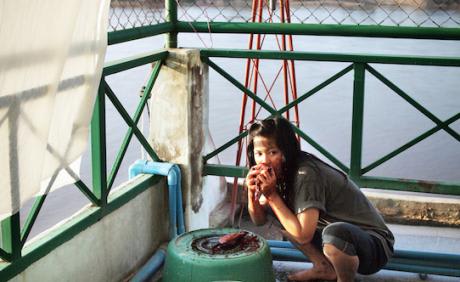In reworking his planned 2002 feature, Ecstasy Garden , injecting rehearsal scenes, documentary footage and other thematically appropriate footage, Thai auteur Apichatpong Weerasethakul has crafted one his most languid and stationary films yet. Mekong Hotel transpires from within the titular hotel, which is situated near a river in Northeast Thailand, along the border of Laos.
Tong (Sakda Kaewattana) and Phon (Maiyatan Techaparn) spend much of their time lounging around the hotel, occasionally lingering over a balcony together, discussing the myths and folklore of their culture while demonstrating failing, or inconsistent, memory — something exacerbated by the rehearsal structure, where repetition comes into play, ending when the characters turn and look at the camera. This modernist context, set against the extended 2011 Thailand flooding, is littered with acknowledgements of greed and laziness amongst government and business officials. Governmental mishandling of the flood is implicated, as is an overall exploitive human nature that sees the incident as an opportunity to inflate the price of boats.
As is standard for a Weerasethakul film, this modern context is infused with tales from the past and supernatural elements, often involving reincarnation and other Buddhist principles. Phon's deceased mother (Pongpas) often shows up as a body-possessing "Pob ghost," telling her daughter about her resentment towards Laotian refugees in the 1970s and her indoctrination as a soldier. Her self-loathing is evident via her greedy, animalistic influence, forcing Phon and Tong into crouched, surreptitious positions while rapidly devouring offal.
Indications of present life conduct affecting one's inevitable next life is the primary motivation here — expanded into the political arena — but this interpretation is as subjective as the film is impressionistic and experimental.
The deliberately oblique Mekong Hotel leaves the camera stationary for most of its hour-long runtime, watching its subjects recount memories with little emotional complexity. These protracted scenes and the minimal action test the patience in a way that Syndromes of a Century and Uncle Boonmee didn't through sheer limitations in variation and narrative creativity.
If anything, this minor art film plays as an offshoot to Weerasethakul's existing auteur vision, reiterating what he's already established, but applying it to some frustration with the government over the handling of a natural disaster.
(Films We Like)Tong (Sakda Kaewattana) and Phon (Maiyatan Techaparn) spend much of their time lounging around the hotel, occasionally lingering over a balcony together, discussing the myths and folklore of their culture while demonstrating failing, or inconsistent, memory — something exacerbated by the rehearsal structure, where repetition comes into play, ending when the characters turn and look at the camera. This modernist context, set against the extended 2011 Thailand flooding, is littered with acknowledgements of greed and laziness amongst government and business officials. Governmental mishandling of the flood is implicated, as is an overall exploitive human nature that sees the incident as an opportunity to inflate the price of boats.
As is standard for a Weerasethakul film, this modern context is infused with tales from the past and supernatural elements, often involving reincarnation and other Buddhist principles. Phon's deceased mother (Pongpas) often shows up as a body-possessing "Pob ghost," telling her daughter about her resentment towards Laotian refugees in the 1970s and her indoctrination as a soldier. Her self-loathing is evident via her greedy, animalistic influence, forcing Phon and Tong into crouched, surreptitious positions while rapidly devouring offal.
Indications of present life conduct affecting one's inevitable next life is the primary motivation here — expanded into the political arena — but this interpretation is as subjective as the film is impressionistic and experimental.
The deliberately oblique Mekong Hotel leaves the camera stationary for most of its hour-long runtime, watching its subjects recount memories with little emotional complexity. These protracted scenes and the minimal action test the patience in a way that Syndromes of a Century and Uncle Boonmee didn't through sheer limitations in variation and narrative creativity.
If anything, this minor art film plays as an offshoot to Weerasethakul's existing auteur vision, reiterating what he's already established, but applying it to some frustration with the government over the handling of a natural disaster.
